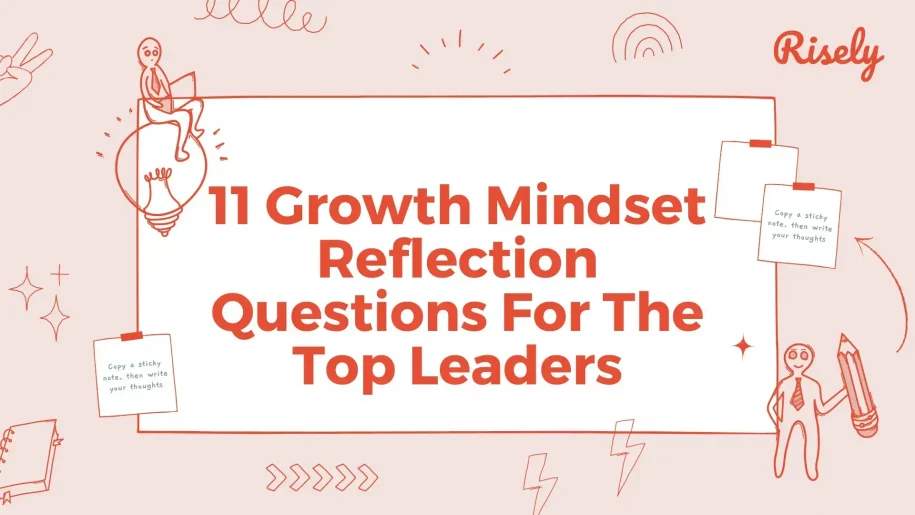11 Growth Mindset Reflection Questions For The Top Leaders
Being stuck in the past is passe. Today’s leaders embrace growth at every step because each action counts in your journey. A growth mindset believes that intelligence, abilities, and talents can be developed through hard work, dedication, and the right strategies. It is about embracing challenges, learning from failures, seeking feedback, and continuously improving. Top leaders understand the importance of reflection in cultivating a growth mindset. They ask themselves thought-provoking questions to assess their progress, set new goals, and foster personal and professional growth. In this blog, we will examine 11 growth mindset reflection questions that can help leaders like you embrace your true potential.11 Key Growth Mindset Reflection Questions for Leaders
Leaders who aspire to cultivate a growth mindset can reap significant rewards by engaging in self-reflection. This process, facilitated by a set of 11 key reflection questions, allows leaders to scrutinize their actions, behaviors, and mindset, paving the way for profound personal and professional growth.What challenges did I overcome today, and what did it teach me?
Reflecting on the challenges you overcome provides leaders valuable insights into their resilience, problem-solving skills, and ability to adapt. By examining the lessons learned from each challenge, you can identify areas for improvement and develop strategies to overcome future obstacles. Embracing challenges as learning opportunities fosters a growth mindset and encourages continuous improvement.How did my failures contribute to my growth this week?
Failures are an inevitable part of any journey toward success. Reflecting on failures allows you to embrace a growth mindset by recognizing the opportunities for growth and learning that arise from setbacks. It helps you develop resilience, learn from your mistakes, and adapt your strategies for future success. By reframing failures as learning experiences, you can foster a culture of growth and continuous improvement within your team.In what areas did I seek feedback, and how did I respond to it?
Seeking feedback is crucial for personal and professional growth. Reflecting on the areas where you sought feedback helps you understand your willingness to learn, be open to different perspectives, and improve your performance. It also highlights your ability to respond to feedback constructively, implement suggested changes, and continuously develop your skills and knowledge.What new strategy did I try in my leadership role, and what was the outcome?
Trying new strategies is essential for growth and innovation. growth mindset reflection questions on the latest methods you implemented can assess their effectiveness and identify improvement opportunities. Evaluating the outcomes of these strategies allows leaders to learn from successes and failures, refine their techniques, and continuously adapt to changing circumstances.How did I foster a culture of growth and learning within my team?
Leaders are critical in creating a culture of growth and learning within their teams. Thinking on your efforts to foster such a culture helps you assess the impact of your actions and behaviors on team members’ development and engagement. It enables you to identify areas for improvement and implement strategies to support your team members’ growth and learning.What are the limits I imposed on myself, and how can I expand them?
Reflecting on self-imposed limits allows leaders to identify the beliefs, fears, or assumptions that may hold them back from reaching their full potential. Recognizing these limits will enable you to develop strategies to overcome them, expand your comfort zones, and embrace new challenges. You can foster personal growth and inspire your teams to do the same by pushing past self-imposed limits.How did I handle a recent setback, and what growth opportunity did I find in it?
Setbacks are inevitable in any leadership journey. Growth mindset reflection questions on how leaders handle setbacks allows them to assess their resilience, problem-solving skills as leaders, and ability to find growth opportunities amidst challenges. By reframing setbacks as learning experiences and identifying the lessons learned, leaders can transform setbacks into opportunities for growth and development.In what ways did I push my team out of their comfort zones to encourage growth?
Leaders are responsible for challenging and inspiring their teams to reach their full potential and attain professional growth for team members. Growth Mindset Reflection Questions on how you pushed your teams out of their comfort zones allows you to assess their effectiveness in fostering growth and learning. You can create a supportive environment that promotes continuous improvement and personal growth by identifying the strategies and approaches that encourage your team members to embrace challenges.What long-term goal am I working towards, and how did I progress this month?
Having long-term goals provides leaders with a sense of purpose and direction. Reflecting on your progress toward these goals helps you assess your commitment, prioritize your actions, and identify areas for improvement. Tracking this progress regularly allows you to stay focused, motivated, and aligned with your long-term vision.How did I demonstrate resilience in the face of adversity recently?
Adversity is an inevitable part of leadership. Reflecting on how leaders demonstrated resilience in the face of adversity allows them to assess their ability to bounce back, adapt, and remain focused on their goals. It also highlights their emotional intelligence, problem-solving skills, and ability to inspire and support their team members during challenging times.What new knowledge did I acquire, and how can I apply it to future challenges?
Continuous learning is essential for personal and professional growth. Growth Mindset Reflection Questions focusing on your new knowledge allow you to assess your commitment to self-improvement, identify gaps, and explore opportunities to apply your newfound knowledge to future challenges. By integrating learning into their leadership practices, leaders can stay ahead of the curve, adapt to changing circumstances, and inspire their teams to embrace continuous learning.Overcoming Common Challenges in Developing a Growth Mindset
Developing a growth mindset can be challenging, as individuals may face resistance to change and fear of failure. Overcoming these common challenges is crucial for cultivating a growth mindset.Navigating Resistance to Change Within Teams
Resistance to change is a common challenge when developing a growth mindset within teams. Leaders can navigate this resistance by clearly communicating the benefits of a growth mindset, emphasizing the value of learning and development, and involving team members in decision-making. By creating a supportive environment and providing opportunities for skill-building and growth, you can overcome resistance to change and foster a culture of continuous improvement.Addressing Fear of Failure and Encouraging Risk-Taking
Fear of failure can hinder individuals from embracing challenges and taking risks. Leaders can address this fear by creating a safe environment that encourages risk-taking and learning from failures. Providing constructive feedback, celebrating efforts and progress, and reframing failures as opportunities for growth can help your team members overcome their fear of failure and develop a growth mindset. By modeling a growth mindset yourself, you can inspire your teams to embrace challenges and take calculated risks.Conclusion
Embracing a growth mindset is crucial for leaders who foster continuous improvement and resilience. Reflect on the challenges you’ve conquered, the feedback you’ve sought, and the strategies you’ve implemented. Encouraging a culture of growth within your team and pushing boundaries are key. Remember, setbacks are growth opportunities, and acquiring new knowledge enhances your leadership journey. As you navigate resistance and fear, focus on developing daily practices that nurture a growth mindset. By prioritizing personal development and innovation, you pave the way for organizational success and impactful leadership.Grab a free growth mindset toolkit for managers!
Start working with frameworks and sample statements designed for managers by experts.
Other Related Blogs


